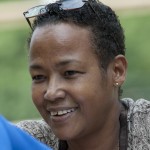Chantal Kenol Desmornes: Bringing it Back to Haiti
0May 14, 2014 by Tom McKenna
 by Chantal Kenol Desmornes
Principal and Language Teacher
Port-au-Prince Haiti
by Chantal Kenol Desmornes
Principal and Language Teacher
Port-au-Prince Haiti
I am co-principal of a private, all-girl, secondary school in Port-au-Prince, Haiti, celebrating its golden jubilee this academic year. In addition to administrative responsibilities, I oversee all academic activities and supervise teachers. I conduct meetings and workshops with teachers and students and meet with parents about academic and disciplinary issues. I occasionally substitute for English and Spanish foreign language teachers, or French and Haitian Creole teachers. I correct quarterly book reports for grades 7 through 12 and regularly teach French conversation skills to seventh and eighth graders.
On Wednesdays, I spend the day at a private school that follows an American online curriculum in Pétion-Ville, a suburb of the capital city. I teach English literature and written communication to students in grade 12 for whom English is a second language.
My Bread Loaf experience has caused me to reflect on my teaching style and strategies. The concepts and experiences I learned about in Bread Loaf courses not only confirmed and reinforced what I have been doing intuitively as a teacher but also challenged my practices. This year I have been trying to accomplish the following resolutions from the teaching manifesto I wrote for last summer’s Multilingual Writing class with Professor Damian Baca:
Resolution 1: Valuing my students’ existing knowledge, literacies, languages and cultures.
While we attended Bread Loaf in Vermont last summer, Ashley Jones from Students at the Center in New Orleans and I planned a collaborative project with our respective students. Ashley proposed a “Picture Story” with our students taking and exchanging pictures of their school lives. The exchange partners would use the pictures to tell their own stories of their respective schools.
I encouraged my students involved in the exchange project to tell the story that THEY believe matters. They were urged to question the aspects of their own backgrounds that have informed their interpretations of other people’s experiences. My students were enthusiastic and curious about seeing how other students from other parts of the world dressed, ate, worked, enjoyed themselves, and interacted with one another. Most important, the students were the ones who chose which aspects of their school lives they wished to share.
For the exchange, I allowed my students, against school policy, to use digital cameras, smart phones, and tablets during school hours to take and transfer photos. I had to rely heavily on their expertise to determine the format and medium for sharing their pictures and stories. The ongoing exchange has yielded a number of positive results in terms of students’ self-esteem, cultural awareness, in-school interaction, and intercultural communication.
Resolution 2: Encouraging and enabling my students to find and define their own voices, to bring into the teaching/learning environment their ideas, concerns, and interests.
One of my students from the American program submitted a narrative essay about his abduction and sequestration a few years ago. In writing that essay, he was, perhaps for the first time, voicing this very traumatizing experience. The examiner from the online program returned the paper ungraded and threatened the student with a disciplinary warning because his essay “contained some information that is inappropriate for a high school writing assignment.” The examiner suggested that the student change his topic into a more “suitable” one. My student was very affected by this judgment that censored his experience and silenced his voice.
My student and I discussed the situation at length and decided to challenge the decision. We wrote a letter to the program director and received his answer in the form of an apology a few weeks ago. The student’s essay was subsequently graded. From that experience, my student understood that his experience mattered and that he has the right to share it in an assertive and personal voice. Bread Loaf has informed my perception of the power dynamics at play in the world, sharpened my sense of justice, and strengthened my resolve to encourage and enable my students to speak up about what matters to them.
Resolution 3: Teaching and enabling my students to think critically about the things that matter to them, so they can progressively claim, build, and transform their community.
Following a BLTN professional development seminar last summer about changing the power dynamics and the deficit model in our schools, I promised myself that my students would be more involved in decisions affecting them. At the start of the school year, I gathered a small group of representatives from the student body to discuss the student code of conduct and school policies. The code was consequently modified to include some of the students’ concerns. The big surprise for me was that the demands were not in the least outrageous. Students understand the need for rules and value an environment that enforces fair and relevant discipline. Empowering my students and giving them a voice has proven very helpful in engaging them in their own learning, making the school environment more relevant to their particular contexts and concerns.
My teaching experience this year has been both challenging and rewarding. Learning to step back and let students get “behind the wheel” is hard to do. As a teacher and a school principal I was forced to consent to be challenged and sometimes criticized. The reward is that my students became more involved. My office, the classroom, and our school became spaces where they could voice their interests, concerns, and desires. This year brought more student-generated activities than ever before, including ecological field trips, cultural events, extracurricular activities, and afterschool peer tutoring. My school this year was a beehive where everyone mattered, and everyone was involved in the life of the community.
Category Bringing it Back, Issue, Spring 2014 | Tags:
Leave a Reply